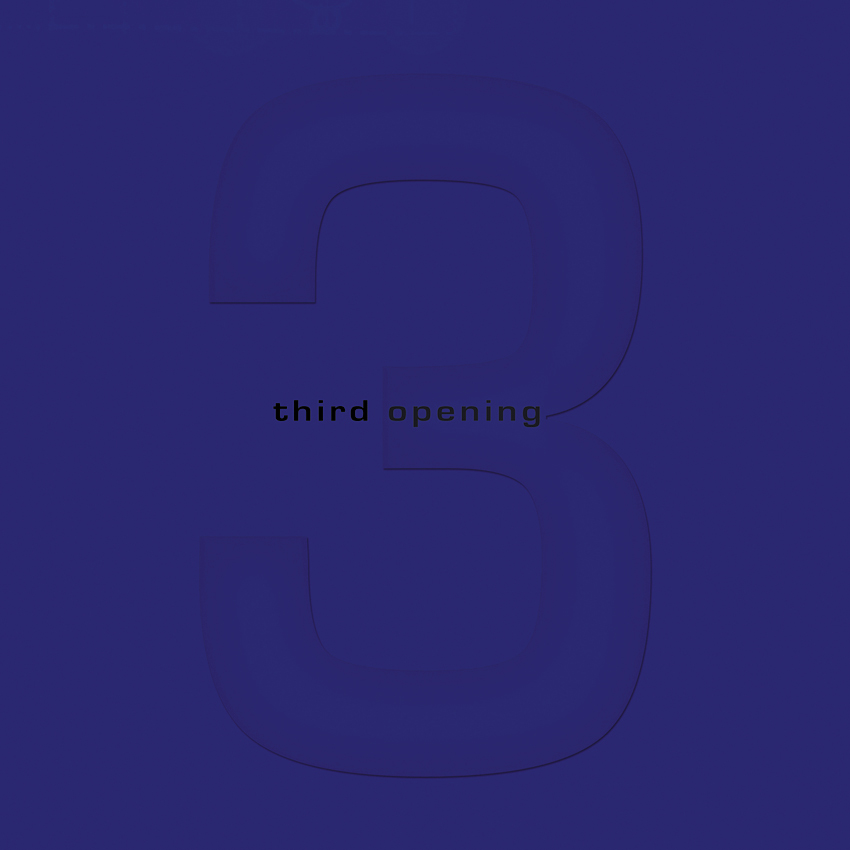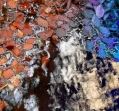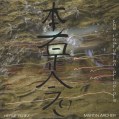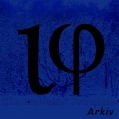49CD - Inclusion Principle - Third Opening - CD plus download
TweetListen

Inclusion Principle operates in a space between electronics, nu-jazz, contemporary electroacoustic music and free improvisation tending towards a minimalist approach.
Hervé Perez - laptop, woodwind
Martin Archer - laptop, woodwind, keys
Peter Fairclough - drums and percussion
Watch Inclusion Principle live at Manchester Jazz Festival & interview by Nigel Slee of Jazz North
Both Martin and Hervé play a similar set up of laptop and woodwinds and yet have a different approach to their instruments. Put together, there is a chemistry that inspire and drive their improvisations towards a wide range of soundscapes. the choice of instruments and sounds on their palette allows them to dramatically change their music between beat driven electro, minimal and microtonal improvisation via electroacoustic experimentation and nujazz. Now joined by master improvising percussionist Fairclough for this third album, there is something for all in their music and, first and foremost, an enjoyment of sound and performance, which carries across and touch their audience, whatever the style they may adopt.
Third Opening is recorded with an almost forensic focus on the small detail within the sound, revealing a seething quantum world of sound just under the surface.
CD A - mainly abstract, some rhythms.
CD B - mainly rhythm, some abstraction.
Inclusion Principle (Hervé Perez on technology and alto sax, Peter Fairclough on drums and percussion and Martin Archer on technology, electric piano, sopranino sax and clarinets) produce an audacious and intriguing blend of free music with more traditional/familiar jazz-derived forms presented over two discs. Fast-paced, and jam-packed, the music veers from one extreme to another, surprisingly even including elements from the more pop end of the musical spectrum, but in no way to its detriment. The second disc is by far the more accessible, while disc one, far from being “hair-shirt” improv (a term – possibly meaning “authentic beyond reproach” – favoured by Trevor Barre in his recent book Beyond Jazz) has almost an electric-era Miles Davis flavour.
The first piece on Disc A, the twelve minute ‘Factor Of Place’, has a quiet beginning and I like it already. Clicking and tapping. It is impossible to identify the source of these noises, and all the better for it. Great separation in the stereo field. If I had to think of a category for this music I’d start with Glitch-Fusion. Skilful juxtaposition of improvised and composed elements. Frantic rubbing of metal objects in the background. Voices mixed way down, possibly field recordings. Seagulls. All of a sudden it breaks into a martial rhythm with a smattering of monosynth and develops a strangely dubby feel. Distant ring modulators sparkle. Then there is melodic resolution courtesy of Martin Archer’s electric piano.
At only six minutes, the next track, ‘Calling From Afar’, features Japanese cymbals and bells manipulated by way of a sampler or software in a way that is vaguely reminiscent of A Monochrome In Warped Atmosphere by Euphonious Murmur Blend from the early 2000s. Find a copy of that if you can. Chanting. If you listen carefully, there’s a fair amount of construction going on here, in some form of digital sequencer but it retains a live feel, possibly due to the piano parts that feel their way in as the piece progresses. ‘Sixty Watt Midnight’, a short piece at a smidge over four minutes, has a vague empathy with Battles’ jazzier output. It has some great ensemble playing in its latter half, while on ‘One Door Opens’, the bells are back like a buffer between the explosions of jazz. Reichian. Towards the end it reminds me of Yello – not their poppiness, but more the sinister mood of their more cinematic material. This feel spreads over into the fifth track, ‘Temple Mining’. From an abstract beginning, Inclusion Principle forge a slow-burning noir classic.
At this point, Third Opening continues on to Disc B for the final three pieces. ‘Borderline Spiral’ starts with immediate drum breaks that sound like they should have come from a record from Ninja Tune or similar label. But then free sax detonates. A feeling that there are no holds barred now. Everything is placed well in the mix and there is excellent use of reverb – i.e. just enough to get the job done and no more. The penultimate track ‘The Overgrown Palace Of Your Mind’ slows the pace a little, while ‘Not Looking For Another Now’ is the longest piece at 23 minutes. It sounds like a recorded live-in-the-studio work-out.
Augmented / informed by software manipulation for sure, but top drawer stuff. Overall, Third Opening is all about technology interfacing with three human beings seamlessly. It is hard to say where this is all edited together, I swear they even program stray drum beats in places, but the performances captured live in the studio are exemplary. Recommended. - SOUND PROJECTOR, PAUL KHIMASIA MORGAN
An avant improv electronic trio with an intriguingly minimalistic recording of spooky laptop electronics, ambient grooves, woodwind/percussive acoustics and found sound. - JAZZWISE, THREE STARS
Inclusion Principle ist das Duo aus Martin Archer und Hervé Perez, die beide derzeit in Sheffield ansässig sind. Mit "Third Opening" erschien im Frühjahr 2015 das dritte Album der beiden. Ihren ersten gemeinsamen Tonträger veröffentlichten Archer und Perez 2006 noch unter ihren eigenen Namen (Hervé Perez and Martin Archer), doch trug dieser schon den Titel "The Inclusion Principle". Mit "The Leaf Factory Fallback" erschien 2010 die zweite CD des Duos, diesmal unter dem Bandnamen Inclusion Principle. Erweitert um den Schlagzeuger Peter Fairclough (der u.a. auch für Keith Tippett und Mike Westbrook tätig ist oder war) entstand danach das auf "Third Opening" zu hörende Material, welches im Zentrum dieser Rezension steht.
"Inclusion Principle operates in a space between electronics, nu-jazz, contemporary electroacoustic music and free improvisation tending towards a minimalist approach", stellt man von Label-Seite zu der auf "Third Opening" zu findenden Musik fest. In der Tat bestimmen elektronische Sounds die Musik, mal freiformatig improvisiert, mal rhythmisch pulsierend, mal strukturiert komponiert. Über dieser Grundlage erhebt sich allerlei weiterer Klang, prozessierte Naturgeräusche (field recordings), farbige Elektronikgeflechte, allerlei Zischen, Brummen und Fiepen, Einlagen von E-Orgel und vor allem E-Piano, dazu noch Sax, Klarinetten, nicht selten Schlagzeug und diverseste Perkussion. Ausgesprochen detailreich, fast verspielt kommt die Musik aus den Boxen und besticht durch die Vielzahl an eingesetzten Klangfarben, Tönen und Geräuschen.
Eher hallend-schwebend und geheimnisvoll arbeitet sich das dichte Klanggemenge voran, verziert mit diversen klagenden Einwürfen von Klarinetten und Sax, hallenden Tönen von Gongs und anderer Perkussion und kürzeren Tastenmustern. Nur selten wird die Musik wüst und lärmend. Immer wieder abreiten sich strukturierte Muster heraus, entwickelt die Band rhythmische Formen, die in Rock oder Jazz beheimatet sind (oder scheinen), die dann aber meist schnell wieder auseinander fallen und sich in minimalistischem, ambientartigem Schweben auflösen. Dazu kommt nicht selten ein gewisses retroprogressives, besser retro-canterbureskes Element, dominiert von hallenden, hypnotisch-intensiven E-Pianolinien und gelegentlich auch waberndem Georgel. Das gemahnt an die Musik von Soft Machine, an die treibend-minimalistischen Momente auf deren Alben der frühen bis mittleren 70er Jahre ("Third" bis "Seven").
Sind die Nummern auf CD1 eher abstrakt und frei gewoben, arbeiten sich auf der zweiten Scheibe die rhythmischen Muster verstärkt in den Vordergrund. Höhepunkt des Albums ist das hier zu findende "not looking for another now", das sich aus einem freien Klangschweben heraus zu einer ausgesprochen intensiven und dichten Nummer im Grenzgebiet von Jazz, Retro-Canterbury und experimenteller Elektronik entwickelt. Beeindruckend! -
"Third Opening" ist ein faszinierendes Album mit progressiver Musik aus England, das freie Elektronik, klangmalende Soundbögen, große klangliche Vielfalt, britische Jazzrocktradition und elektronischen (Free-)Jazz zu einem ganz eigenen, beeindruckenden Ganzen vereinigt. Eine dicke Empfehlung für aufgeschlossene Klangabenteurer! - ACHIM BREILING, BABYBLAUE-SEITEN
On this set, the sounds range from environmental field recordings, computer-generated sounds, saxophones, piano and percussion. From minimal soundscapes to wild hyper-rhythms, the pieces blend and weave their way through two CDs of diverse sonic contexts. - CHRIS MELOCHE - Wired For Sound
Toute autre ambiance pour cet autre double cd d’Inclusion Principle, le troisième du duo augmenté par Peter Fairclough, toujours présent à la batterie et aux percussions de toute sorte. Martin Archer retrouve Hervé Perez pour créer un univers peuplé de sons électroniques grâce aux ordinateurs, processeurs, ipad… et quelques instruments traditionnels comme le piano, l’orgue, le sax alto, le sopranino, les clarinettes basses… Le premier disque développe plutôt le côté abstrait de la musique, avec un peu de rythme, et c’est l’inverse qui se passe dans le second cd. On peut être plus attiré par un des aspects plutôt que par l’autre, mais le subtil équilibre entre sonorités acoustiques et électro-acoustiques s’établit lentement en parcourant les huit pièces de ces disques, alors qu’au départ les deux manipulateurs ont une approche complètement différente l’une de l’autre. Ces disques révèlent sans arrêt des surprises à chaque écoute, ne serait-ce que par l’ajout des percussions et par un fourmillement de sons qui jaillissent de sous la couche de surface déjà particulièrement riche. - PHILIPPE RENAUD IMPROJAZZ
To pojmenování je dvojznačné: Third Opening označuje, že jde o třetí album dua (nyní vlastně tria) Inclusion Principle (po Inclusion Principle z roku 2006 a po The Leaf Factory Fallback z roku 2010), ale zároveň predikuje, že tu půjde o vždy nové nebo alespoň zrenovované otevírání nových možností. Martin Archer, který současně vyrukoval hned se třemi naprosto různorodými kompakty (viz nedávný referát o jeho dalším spřežení s vokalistkou Julií Tippetts, ale také projekt Engine Room Favourites, jehož zhodnocení nás teprve čeká), a jeho partner Hervé Perez tu opět vyrukovali s téměř totožným arzenálem, tedy s laptopy, saxofony či klarinety, s elektronikou, terénními nahrávkami, ipadem a tak dále, oba se ve vzájemném sváru nesváru podílejí na osmeru skladeb jak kompozičně, tak aranžérsky, což nevylučuje značný podíl improvizace, především se však dost výrazně odlišují v uchopení/pochopení možností těchto nástrojů, a právě z této antipódie vykřesávají výsledné verze zvolených témat od toho nejkratšího (Sixty Watt Midnight, 4:06), až po ten nejrozsáhlejší (Not Looking for Another Now, 23:03). Navíc si přizvali razantního bubeníka a perkusistu Petera Fairclougha, který jejich počiny prorytmovává, dokalibrovává a vyhutňuje. Oč v základě jde: o výbušnou směs hlukoviny, elektrikařiny, jazzového pomelodizovávání, příměsi minimalizujících prvků, mikrotonálního experimentování, založeného na briskním sledu zvukově disparátních detailů. Jenomže tato směsice není nahodilá. Hráči ji vždy nanovo poznenáhlu odhalují, vynořují svoje hudební poblouznění z tajemné hlubiny, střídmě hloučivostně, vysoukávavě, vybičovávaně, vyklouzávaně, jejich teteření se snoubí s přelivy popraskávajících, cinkajících a odklepávaných vsuvek, a právě toto placírování, třísnění a přesýpání nabývá na mohutnosti a zbojnosti. Toto bataliónění, kdy hráči vyzvoní všechno, co vědí i nevědí, má jak svou halucinačnost, tak náhalně prostorové bouřnění, které je hromovládné i zaříkavé, doupnavé i zahltivé, harampádné i celebrující, zápalnostní i proklekáněné. Tyto odlišnosti, následující občas s odstupem, jindy ráz naráz, jsou pozotvírávány a vychytávkovány (s podbombičkami trvdošíjnůstek či uškudleného paběrkování) nejenom mezi jednotlivými čísly, jsou rozhudbovávány i uvnitř rozměrnějších skladeb, provískávaně nad perkusivním tepichem nebo úhořovitě nad zapošívkou rozpornění a vyskladňovány průklestovým vyhroucňováním a la blýskání na časy. Jeví se vám tento způsob hraní poněkud drastickým? Když si na něj navyknete, začnete chápat, jak, kdy a kde muzikanti najdou koloběžkující přechod od drážnějícího praskocení do zavelebněné hymničnosti, od vřídelného vypekelňování do hrubozrnného protrubování s hmoždinkami střelkující zachrucenosti, to vše semleto v čarodějném mlýnku navnadivosti, rumpálové prospojnosti, vyčkávavého halouznění a střemhlavého pozemětřesňování, okšírovaného pod(b)roušenými bicími. Celá zvuková postrojnost je rožnivá, fukéřovaná, žblabuněčná i zašifrovávaná, jak kdy, podstatné však je, že tu nic není podáváno po lopatě, vše se chruje ve vzájemných takřka-obezličkách, var(i)ovánkách, styčnostních posunech, vyhrocováním trylkující linky nad žvavostí doprovodu. Zejména závěrečná kompozice přímo překypuje nadrožďovaností, lávově se valí i změteně kočáruje, má rdousivou zahrocenost i obepínavé protlampačnění, svišťující svíravost, je řádivě trylkující i odklidňovávaně orodující… až po konečné zavroucnění a odkolísání do nenávratna.
Nejsem si jist, zda bych se k poslechu tohoto dvojalba chtěl a mohl okamžitě vrátit, ale jeho ostražité sledování bylo pro mne každopádně silným zážitkem. A to už o něčem svědčí. Především o tom, že Archer se pokaždé a vždy jiným způsobem snaží kráčet per aspera ad astra. – ZDENEK SLABY, HISVOICE
Questo album doppio è il terzo lavoro del duo composto da Hervé Perez (laptop, fiati) e Martin Archer (laptop, fiati, tastiere), per l’occasione arricchito dalle percussioni di Peter Fairclough. Nei due dischi (il primo più astratto, il secondo più ritmico, come recita il comunicato stampa di presentazione del lavoro) rumori sintetizzati, elettroacustici e acustici (sibili, ronzii gracchiamenti, pulsazioni) si combinano al piano elettrico, agli interventi puntuali dei fiati e alle percussioni grazie a un’accurata costruzione sperimentale. Sul piano stilistico, Nujazz, free improvisation, elettronica, avanguardia dipingono così un affascinante quadro minimalista, a tratti psichedelico (ci ascolto i Pink Floyd), a tratti – specialmente nel secondo disco, che, seppur leggermente, preferisco – con reminescenze fusion (la fusion eccellente dei Weather Report di Shorter e Zawinul). E non di rado – attingo questo giudizio da una recensione tedesca, che condivido – gli ambienti sonori generati ci riportano felicemente alla scena progressive di Canterbury tra i ’60 e i ’70. Dalla prima (factor of place) all’ultima traccia (not looking for another now) è impressionante il modo in cui da atmosfere instabili, vaghe e nebulose sorge e si impone – nella semplicità di una logica musicale cristallina – un inesorabile, potente e deciso groove ritmico, che lascia poi spazio, altrettanto logicamente, a momenti più riflessivi. Un capolavoro. – KATHODIK
This double album is the third album by the duo composed of Herve Perez (laptop, woodwinds) and Martin Archer (laptop, woodwinds, keyboards), for the occasion enriched by the percussion of Peter Fairclough. In the two discs (the first more abstract, the second more rhythmic, as stated in the press release of the presentation) synthesized, and electroacoustic sounds (whistling, humming, throbbing gracchiamenti) combine on electric piano, punctual interventions of winds and percussion through a careful experimental construction. Stilistically, Nujazz, free improvisation, avant-garde electronics, paint a fascinating picture, sometimes psychedelic minimalist (i listen to Pink Floyd), sometimes – especially in the second disc, which, albeit slightly, I prefer – with reminiscences of fusion (the excellent fusion of Weather Report with Shorter and Zawinul). And not infrequently – I take this judgment by a review, which I support German-generated sound environments bring us happily to the Canterbury scene progressive among the ' 60 and ' 70. The first (factor of place) to the last track (not looking for another now) is impressive how unstable atmospheres, is vague and nebulous and imposes itself – in the simplicity of a crystalline musical logic – a powerful and inexorable, rhythmic groove, who decided then leaves space, just as logically, in more reflective moments. A masterpiece. – KATHODIK
On the first of two disks the music lies bubbling and scratching somewhere between avant-garde jazz, electro-acoustics and free improvisation, with the pseudo-ethnic sounds of 'One Door Opens' the highlight. Disk two is more rhythmic, and in my opinion stronger, as morphed beats and synth stabs mutate under the trio's forensically observant jazz-eyes - hints of Weather Report in the gobsmacking opening cut 'Borderline Spiral', while 'Not Looking For Another Now' is twenty three minutes of mysterious, semi-intelligible synth and woodwind exploration. The further edge of jazz. - TERRASCOPE
Inclusion Principle expand and retract and here they are a trio. They seemingly nonchalantly raise the spirits, 'house wrecking' as the old gospel parlance might have it, but in a kind of abstract, formal, painterly way. They aren't faking their planned improvisation either, at one point you can see the musicians trying to re-lock in some way, rescuing the piece from the edge of chaos right in front of our eyes and ears, like a boat trying to pull away from the edge of Niagra Falls. Where Archer is concerned, time will show the wiser. Every project he touches is immediately plugged into a subterranean lava flow of great British avante practice. - STEVE HANSON, LIVE REVIEW, MANCHESTER JAZZ FESTIVAL
Inclusion Principle are a trio comprising a myriad of electronics, found sounds, laptops, keyboards, reeds, drums and percussion. They make minimalistic experimental music focussing on incremental change and micro-detail, often ruptured by noises off and rhythmic shifts, both humanly and electronically generated.
This strange hybrid produces a world where the space is as important as what fills it. Oddly hypnotic, but far from meditative, Third Opening maintains the Discus tradition of sprawling double albums where time ceases to have meaning. The oft used electric piano and the nature of the beats puts this album firmly in a nu-jazz bracket, a pigeonhole that seems to me to have no boundaries, and is therefore more than fitting in this case.
Third Opening is described aptly on the PR sheet as "CD A - mainly abstract, some rhythms. CD B - mainly rhythm, some abstraction." Definitely one for the adventurous among you! - ROGER TRENWITH, ASTOUNDED BY SOUND
INCLUSION PRINCIPLE - Third Opening (Discus 49; UK) Unsure what defines an inclusion principle but damn if it doesn’t cause my head to spin 'round. This dazzling two-disc set might well make strong men weak in the knees, reconstruct entire tonal vocabularies wholecloth, and, frankly, merit the necessity of an additional set of virgin ears, such are the mind-boggling surfeit of intermixtures on display. Herve Perez and Martin Archer conduct much in the way of sonic sorcery hereabouts, bridging warm worlds and otherwise, inaugurating yet another blush of asymmetric Discus electronica to melt the linings of even the most discerning cochlea. Wielding a baker’s dozen of acoustic, electric, and digital accoutrements and further undergirded by the nimble fingers of percussionist Peter Fairclough, the three resemble a small, mobile, intelligent coterie of gremlins left to run amok in the studio, brandishing a fistful of moxie, armed to the teeth. But this isn’t mere studio lollygagging, hapless muso derangement, or improvisation by happy accident; there’s a definitive method to these chaps’ madness, a commitment to brazen experimentalism that yields a sense they’re all having one helluva time making such brave noise. Transcending even the Afro-futurisms of Jon Hassell, Third Opening builds on the concepts of ancient future, retrofitting indigenous fixtures within the amoeba-like wonderworlds of contemporary sound design. But cybernetics aside, this stuff is firmly hands-on; digits aren’t only sweeping across trackpads and touchscreens but also massaging cymbals, mallets, brass valves, assorted natural ephemera. “Calling from Afar” trembles across a hallucinogenic Pekingnese gamelan as performed on the Nostromo. The martial art declarations and backmasked hornswoggle of “Sixty Watt Midnight” ride roughshod over a laptop-rinsed klingklang whose brontosaurus rhythms skulk drunkenly about the meridian. And the epic twenty-three minutes of “Not Looking for Another Now” peel back the membrane covering Hassell's ersatz techno-jungle to reveal verdant environments teeming with chattering life, Perez and Archer’s tintinnabulations augmented by Peter Fairclough’s random acoustics, catapulting the trio's speculative fictions well beyond the id. These are recordings virtually mandating Pauline Oliveros’s dictum of deep listening, the kind of work whose enigmatic pleasures fracture time and bend space. - Darren Bergstein, DMG





 38CD - Inclusion Principle - The Leaf Factory Fallback - CD plus download
38CD - Inclusion Principle - The Leaf Factory Fallback - CD plus download 29CD - The Inclusion Principle - CD plus download
29CD - The Inclusion Principle - CD plus download 82DL - Inclusion Principle - Arkiv
82DL - Inclusion Principle - Arkiv